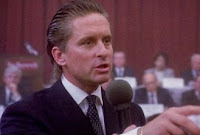- Don't state the obvious (Even if t might be good)
- Dont make it on the nose
- Too formal dialogue (I dunno -NOT- I don't know!)
- Different people speak in different ways. (Dont have them speaking the same way) Want to have characters having their own traits.
- Unspeakable dialogue
- Don't be too grammatical
- Long speeches
- Giving too much information via dialogue- need to know basis! show not tell!
-
Not everything has to be dialogue, things can be shown by reactions, interactions or expressions.
Dialogue that has a contradiction to it is great dialogue (Facial expressions?)

Greed is Good (Wall Street 1987 https://www.youtube.com/watch?v=VVxYOQS6ggk)
- Greed isn't good and it wakes up the audience
- The fact he can get up and say that slightly disturbs the audience
- No facial expressions but yet is still a powerful speech that we will listen to.
The things that are most important to you are going to be the hardest things to say - For example "I'm not sorry" probably means that you are sorry. Denial is one of the most useful things in dialogue.
Dialogue should not be what it appears to be about.
Using words they are unlikely to use might make it more funny. Old person swearing in a certain way would be much funnier to the audience than a normal person saying the same thing.
Different characters have different expletives, and different traits in their language.
People speak in rhythm and certain accents say certain things in certain ways. Something that might be funny in Birmingham might not be funny in South London.
Anger is particularly good of being expressed by words.
Characters:
You should know the characters in your scripts as well as your friends and also in the same sort of way.
Most characters end in failure - If you're not sure how your character will fail, you probably don't have a character.
A film where all is done is good is boring.
"Tells" are characters giving themselves away but without them realising it.
Backstory: It describes the character externally.
In film characters can develop,within the first 20 pages something extraordinary has happened to them. How they deal this is how they have changed through the film
You can't do this in TV because if a character changed in the first episode it means there is very little that can happen there on. Your character is not what you CAN talk about it'd what you CAN'T talk about.
Paradox - A doctor but he has cancer, A police officer who robs banks.
The only stupid question is the one you didn't ask.
Characters have big "BUTS" its dramatic irony - The undertaker that has to bury himself.
Characters - Their flaws and what they struggle to talk about.
Does the audience know more about the character than the character does himself.


No comments:
Post a Comment